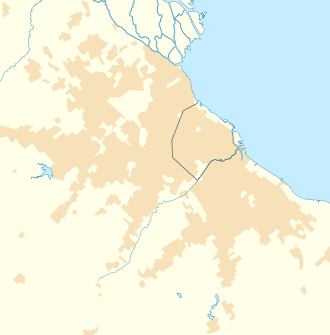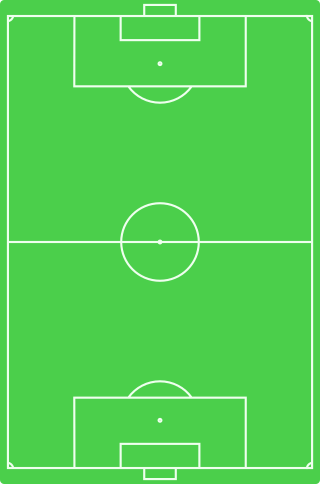Top Qs
Timeline
Chat
Perspective
2023 Argentine Primera División
Football league season From Wikipedia, the free encyclopedia
Remove ads
The 2023 Argentine Primera División - Liga Profesional (officially the Torneo Binance 2023, until the 26th round, for sponsorship reasons)[1][2] was the 133rd season of top-flight professional football in Argentina. The league season began on 27 January and ended on 30 July 2023.[3]
Twenty-eight teams competed in the league: twenty-six returning from the 2022 season as well as two promoted teams from the 2022 Primera Nacional (Belgrano and Instituto).[4][5] Boca Juniors were the defending champions.
River Plate won their 38th national league championship with two matches to spare after they defeated Estudiantes (LP) 3–1 on 15 July 2023.[6]
Remove ads
Competition format
The competition was run under a single round-robin, contested by 28 teams (26 from the previous edition plus 2 promoted from Primera Nacional). The champions qualified for the 2024 Copa Libertadores as Argentina 1. The qualification for international tournaments will be determined by an aggregate table of the 2023 Primera División and 2023 Copa de la Liga Profesional first stage tournaments.[7]
In this season two teams were relegated to the Primera Nacional. One team was relegated based on coefficients, while the bottom team of the 2023 aggregate table would also be relegated.[8]
Remove ads
Club information
Summarize
Perspective
Stadia and locations
Locations of the 2023 Argentine Primera División teams outside Greater Buenos Aires.
Locations of the 2023 Argentine Primera División teams within Greater Buenos Aires.
Personnel
Managerial changes
- 1.^ Originally
 Luca Marcogiuseppe would be manager of Arsenal along with Carlos Ruiz,[83] but he resigned before the beginning of the season.[84] Marcogiuseppe was replaced by Martín Cicotello.
Luca Marcogiuseppe would be manager of Arsenal along with Carlos Ruiz,[83] but he resigned before the beginning of the season.[84] Marcogiuseppe was replaced by Martín Cicotello.
Interim managers
- 2.^
 Marcelo Bravo and
Marcelo Bravo and  Hernán Manrique were interim managers in the 6th round.
Hernán Manrique were interim managers in the 6th round. - 3.^
 Pedro Monzón was interim manager in the 2023 Copa Argentina round of 64 and the 9th–11th rounds.
Pedro Monzón was interim manager in the 2023 Copa Argentina round of 64 and the 9th–11th rounds. - 4.^
 Mariano Herrón was interim manager in the 9th–10th rounds and the 2023 Copa Libertadores Group stage 1st round.
Mariano Herrón was interim manager in the 9th–10th rounds and the 2023 Copa Libertadores Group stage 1st round. - 5.^
 Marcelo Mosset was interim manager in the 10th–11th rounds.
Marcelo Mosset was interim manager in the 10th–11th rounds. - 6.^ Interim manager, but later promoted to manager.
- 7.^
 Darío Espínola was interim manager in the 16th–17th rounds.
Darío Espínola was interim manager in the 16th–17th rounds. - 8.^
 Daniel Jiménez was interim manager in the 2023 Copa Argentina round of 64.
Daniel Jiménez was interim manager in the 2023 Copa Argentina round of 64. - 9.^
 Marcelo Bravo was interim manager in the 2023 Copa Argentina round of 64, the postponed 17th round and the 20th–21st rounds.
Marcelo Bravo was interim manager in the 2023 Copa Argentina round of 64, the postponed 17th round and the 20th–21st rounds. - 10.^
 Claudio Cabrera and
Claudio Cabrera and  Marcelo Broggi were interim managers in the 22nd round.
Marcelo Broggi were interim managers in the 22nd round. - 11.^
 Cristian Zermatten was interim manager in the 2023 Copa de la Liga Profesional Group stage 3rd round.
Cristian Zermatten was interim manager in the 2023 Copa de la Liga Profesional Group stage 3rd round. - 12.^ Salomón would be interim manager until the end of the Copa de la Liga Profesional, but only was interim manager in the 2023 Copa de la Liga Profesional Group stage 4th–8th rounds.
- 13.^ Interim manager until the end of the Copa de la Liga Profesional.
- 14.^ Interim managers until the end of the Copa de la Liga Profesional.
Foreign players
As the championship ended on 30 July 2023, several players left their teams due to expiring contracts or loans, signed with other teams, or had their contracts terminated. Players in italics are those who left their club before the end of the tournament.
- a Newell's Old Boys signed a seventh foreign player due to left knee injury of
 Fabián Ángel.[85]
Fabián Ángel.[85]
Players holding Argentinian dual nationality
They do not take up a foreign slot.
 Dylan Gissi (Banfield)
Dylan Gissi (Banfield) Bruno Zapelli (Belgrano)
Bruno Zapelli (Belgrano) Norberto Briasco (Boca Juniors)
Norberto Briasco (Boca Juniors) Frank Fabra (Boca Juniors)
Frank Fabra (Boca Juniors) Luciano Bocco (Central Córdoba (SdE))
Luciano Bocco (Central Córdoba (SdE)) Matías Soria (Godoy Cruz)
Matías Soria (Godoy Cruz) Cristian Báez (Independiente)
Cristian Báez (Independiente) Juan José Cáceres (Lanús)
Juan José Cáceres (Lanús) Gabriel Arias (Racing)
Gabriel Arias (Racing) Catriel Cabellos (Racing)
Catriel Cabellos (Racing) Nicolás de la Cruz (River Plate)
Nicolás de la Cruz (River Plate) David Martínez (River Plate)
David Martínez (River Plate) Luca Martínez (Rosario Central)
Luca Martínez (Rosario Central) Agustín Módica (Rosario Central)
Agustín Módica (Rosario Central) Iván Leguizamón (San Lorenzo)
Iván Leguizamón (San Lorenzo) Andrés Vombergar (San Lorenzo)
Andrés Vombergar (San Lorenzo) José Mauri (Sarmiento (J))
José Mauri (Sarmiento (J)) Matías Catalán (Talleres (C))
Matías Catalán (Talleres (C)) Daniel Ribera (Talleres (C))
Daniel Ribera (Talleres (C)) Mateo Retegui (Tigre)
Mateo Retegui (Tigre) Lenny Lobato (Vélez Sarsfield)
Lenny Lobato (Vélez Sarsfield)
Tomás Avilés (Racing) played with Chile at the 2023 South American U-20 Championship in January 2023, but later played with Argentina at the 2023 FIFA U-20 World Cup in May 2023.
Source: AFA
Remove ads
Incidents
The Unión vs. Lanús match (14th round, 30 April 2023) was postponed due to a lack of safety guarantees for the occupants of a seating area in the Estadio 15 de Abril, as a result of a landslide from a drainage channel caused by the strong winds that hit the stadium.[86] The match was played on 17 June 2023.
The Vélez Sarsfield vs. Racing match (17th round, 19 May 2023) was postponed due to the death of Hernán Manrique, manager of Vélez Sarsfield reserve team along with Marcelo Bravo.[87] The match was played on 17 June 2023.
During the match between River Plate and Defensa y Justicia at the Estadio Mâs Monumental (19th round, 3 June 2023), a fan fell to his death during the game, resulting in the match being suspended by the referee in the 26th minute.[88] The match resumed on 17 June 2023.
League table
Source: AFA
Rules for classification: 1) points; 2) goal difference; 3) goals scored; 4) fair play ranking 5) drawing of lots.
(C) Champions
Rules for classification: 1) points; 2) goal difference; 3) goals scored; 4) fair play ranking 5) drawing of lots.
(C) Champions
Remove ads
Results
Summarize
Perspective
Teams played every other team once (either at home or away) completing a total of 27 rounds.[89]
Remove ads
Season statistics
Remove ads
Awards
Best Team
The best team was a squad consisting of the most impressive players at the tournament.[90]
Substitutes
Remove ads
Aggregate table
Summarize
Perspective
International qualification
The 2023 Argentine Primera División champions, 2023 Copa de la Liga Profesional champions and 2023 Copa Argentina champions earned a berth to the 2024 Copa Libertadores. The remaining berths to the 2024 Copa Libertadores as well as the ones to the 2024 Copa Sudamericana were determined by an aggregate table of the 2023 Argentine Primera División and 2023 Copa de la Liga Profesional first stage tournaments. The top three teams in the aggregate table not already qualified for any international tournament qualified for the Copa Libertadores, while the next six teams qualified for the Copa Sudamericana.[7]
Relegation
In this season, the bottom team of the aggregate table would be relegated to the 2024 Primera Nacional. If two or more teams were level on points, extra matches would be played to decide which team would be relegated.
Source: AFA
Rules for classification: 1) points; 2) goal difference; 3) goals scored; 4) fair play ranking 5) drawing of lots.
(O) Play-off winners; (R) Relegated
Notes:
Rules for classification: 1) points; 2) goal difference; 3) goals scored; 4) fair play ranking 5) drawing of lots.
(O) Play-off winners; (R) Relegated
Notes:
- River Plate, Rosario Central and Estudiantes (LP) qualified for the Copa Libertadores group stage by winning the 2023 Argentine Primera División, the 2023 Copa de la Liga Profesional and the 2023 Copa Argentina, respectively.
Relegation playoff
As Colón and Gimnasia y Esgrima (LP) finished with the same number of points in the aggregate table, the tournament rules required them to play a playoff match at a neutral venue to determine the relegated team. If tied, extra time would be played and if the score was still tied after extra time, a penalty shoot-out would be used to determine the winners.
Gimnasia y Esgrima (LP) won the match 1–0 and remained in the Primera División, while Colón were relegated to the Primera Nacional.[91]
Referee: Andrés Merlos
Remove ads
Relegation based on coefficients
Summarize
Perspective
In addition to the relegation based on the aggregate table, one team was relegated at the end of the season based on coefficients, which took into consideration the points obtained by the clubs during the present season (aggregate table points) and the two previous seasons (only seasons at the top flight were counted). The total tally was then divided by the number of games played in the top flight over those three seasons and an average was calculated. The team with the worst average at the end of the season was relegated to Primera Nacional. Originally two teams would be relegated based on coefficients but, on 22 June 2023, AFA decided to reduce the number of relegated teams to one.[8]
Source: AFA
See also
References
External links
Wikiwand - on
Seamless Wikipedia browsing. On steroids.
Remove ads


